Text



To put the following Shop closed logo on PayPal payment pages...
http://www.evbitz.uk/EVBitz.uk/Logos_files/EVBitz%20closed%20untill%20-_1.jpg
Put in ‘Logo Image URL’ field.
Normal - EVbitz logo for paypal.jpg
Alternative 16A Re-Purposed Tethered EPC - £65 - Out of Stock
I also have some tethered 16A (fixed 16A output ONLY) EPCs of a slightly different design that have been removed from new and unused EVSEs due to them being upgraded to 32A. These are available at a special price of £65 including P&P. Their dimensions, appearance and function is essentially identical to the Viridian unit, but they come with a pre-wired tri-colour status indicator LED rather than the integrated one on the Viridian/Mainpine EPCs. See the ‘Add to Cart’ payment button to purchase (below). The LED requires a 19mm panel cutout and projects 32mm behind the panel and 3mm in front.
NB: The output of these units is fixed at 16A. It is not configurable like the Viridian units.
This EPC is 3 phase compatible.
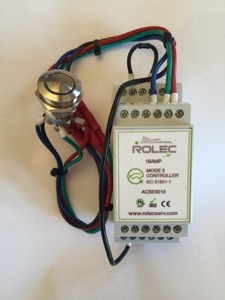
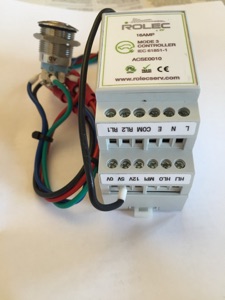
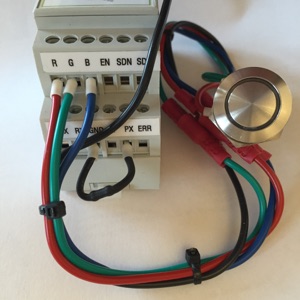
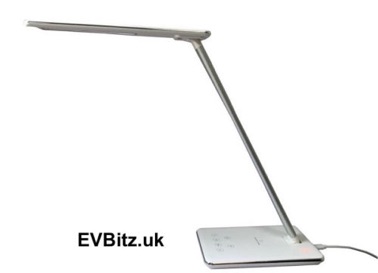
(Only available in black)
Sorry - Out of Stock

3. Type 1 Full Portable Kit - Tethered Option:
Weatherproof Box, RCBO, EPC, COntactor, Wiring Loom, Cable Entry Glands and Type 1 Plug/5m Cable...
10A version has a UK BS1363 plug, the 16A version has a 16A CEE (blue commando) plug and the 32A version has a 32A CEE plug (not shown). Over-current, ground fault and thermal protection built-in. The 10A version uses 1.5mm2 output cable, the 16A version 2.5mm cable and the 32A version uses 6.0mm2 cable (4.0mm2 on input).
Main box is 175mmL x 125mmW x 102mmD. 5m kit weighs: 2.3kg

+

+
+
+
+
+

=

Type 1 Full Portable Kit Options:
In Stock

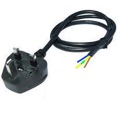
+
OR
(Type 2 plug shown - Type 1 kits will be supplied with a Type 1 plug)



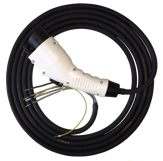

Sorry - Out of Stock
Sorry - Out of Stock
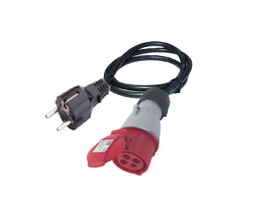

4. Type 2 Full Portable Kit:
Weatherproof Box, RCBO, EPC, Contactor, Wiring Loom, Cable Entry Glands and Type 2 Plug/5m Cable...
10A version has a UK BS1363 plug (shown), the 15A version has a 16A CEE (blue commando) plug and the 32A version has a 32A CEE plug (not shown). Over-current, ground fault and thermal protection built-in. The 10A version uses 1.5mm2 car-side (EVSE output) cable, the 16A version 2.5mm cable and the 32A version uses 6.0mm2 cable (4.0mm2 on input).
Main box is 175mmL x 125mmW x 102mmD. 5m kit weighs: 2.3kg

+

+
+
+
+
+

=

Type 2 Full Portable Kit Options:

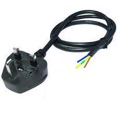
+


+

+
+
+



+


+
AND/OR

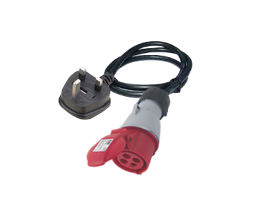
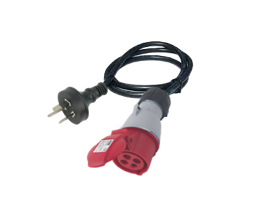
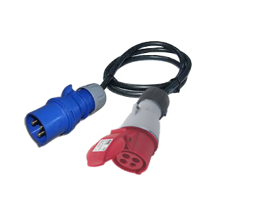
+

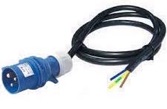
OR
AND/OR
AND/OR
13A(10A)
‘UK’
16A
‘16A CEE’
16A
Schuko
‘EU’
10A
Australian
‘Oz’
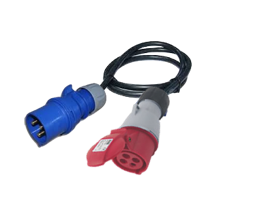
AND/OR
32A(16A)
‘32A CEE’
5. Type 2 Full Modular Portable Kit - 16A Max:
Weatherproof Box, RCBO, EPC, Contactor, Wiring Loom, CEE 230VAC Mains Inlet and Type 2 ‘Free cable’ Socket...
Over-current, ground fault and thermal protection built-in. Main box is 175mmL x 125mmW x 102mmD.
Weights of basic box options and various pigtails are shown in price dropdown list.
This kit has swappable mains input pigtails for use with different types of mains supply socket on the supply end, ie UK BS1363 (3 pin, 13A), EU Schuko (16A), CEE (16A). The EVSE end of the pigtail has a 16A, 4 pin CEE plug which uses the 4th pin to automatically program the correct maximum current for that particular pigtail when the pigtail is connected to the pEVSE.
On the output side, the pEVSE has an integral Type 2 socket instead of the usual tethered cable and EV plug so that users can use their existing Type 2>Type 1/Type 2 charging cable thereby avoiding the need to carry a second heavy and bulky 5m EV cable/plug.
Please note that there is no locking mechanism to lock the Type 2 output plug into the pEVSE box. This may become available and added later if needed.
Please also note that, due to the nature of the design, this device should not be directly exposed to water. So if used outside it should be protected from direct rainfall, for example.
Type 2 Full Modular Portable Kit Options:
In Stock
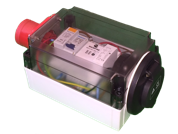
=
In Stock
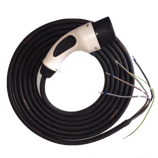
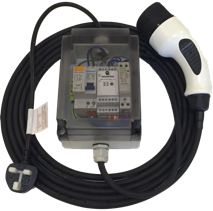

Sorry, temporarily out of stock (awaiting switches - due in 3 days)
Please Note:-
This Store Will be Temporarily Closed from 21st to 28th August 2017
However, I’ll be able to supply limited stock (no EVSE kits), so if you want something please email me - sales@evbitz.uk
4. EVSE Extension Cables - 5m - 16A & 32A
In Stock - from £150
Price includes P&P
If the extension you need comes with a socket in a box, the box containing the standard socket can be free-standing or mounted to a wall or other surface using 2 stainless steel screws (M3.5) screws (supplied). The lid must be removed (and re-secured - using a ~6mm Phillips-type screwdriver) to fix the box to a surface but the use of the fixing holes does not alter the water ingress protection of the socket box. The box should *not* be permitted to lie on the ground as it is not waterproof (the box is, however, more waterproof than a standard Type 1 or 2 connection). It is also liable to be run over if left on the ground. The box’s external dimensions are:- 125Hx115Wx58Dmm. It is of robust construction in ~3mm thick ABS plastic.
Free postage* is included which usually takes 2-3 days within mainland UK (excluding weekends) - but may take as much as 10 days.
(* UK orders only - ex-UK orders must have extra postage added - see the ‘Shipping Information’ page)
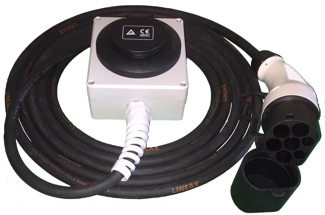
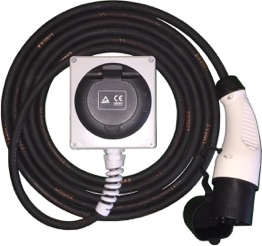
Options:
These extension cables will permit the use of any standard Type 2 to Type 1 or 2 charging cable or tethered EVSE (charge-point) cable to be extended by 5m. They are rated at either 16A or 32A and the cable uses 2.5mm2 or 6.0mm2 conductors according to the type.
There are 3 versions of extension available according to what you are trying to extend (please see the graphic below):-
Example: EXT-FC-16
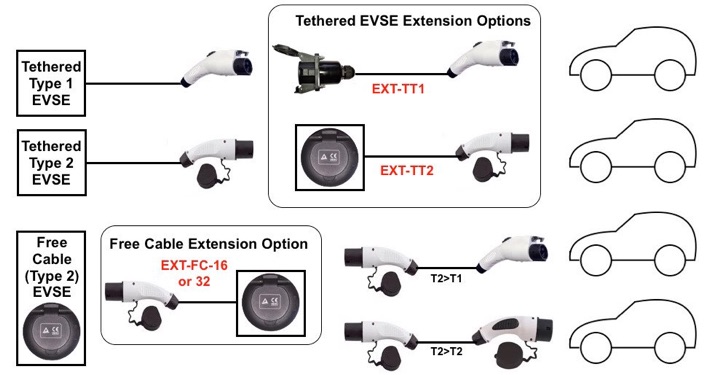
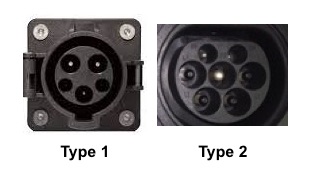
An EV Cable-Buyer’s Note:
Firstly, the proper name for an EV charging station is an EVSE (electric vehicle service/supply equipment). This applies across the board, DC or AC, high or low power, fixed or portable.
Early production EVs did not, generally, have a charging socket but instead had a permanently attached charging cable with a 13A or other usually industrial-type charging plug attached. Modern EVs now have a socket which is referred to as either ‘Type 1’ (aka ‘T1’) or Type 2 (aka ‘T2’, or ‘Mennekes’ - see photo, right). They conform to one of 2 international standards:- either SAEJ17172 or ISO62196, respectively.
What follows are my thoughts, as an experienced EVer, on the typical EVer’s need for a basic charging cable. EV makers generally used to supply a portable charging device which plugged into a standard UK, 3 pin, 13A socket (AKA ‘Granny Charger’ or, more properly ‘Mode 2 EVSE’, or even easier, a ‘pEVSE’). Latterly they have stopped providing the - much more expensive - pEVSEs and started providing either a simple ‘T2 to T2’ or ‘T2 to T1’ cable, as appropriate to the EV in question. My choice for the naming convention, incidentally, is to use a name which describes the function; in this context the cable delivers electrical current from a socket to the EV and hence the cable name format is ‘source to destination’ eg ‘Type 2 (charging station) to Type 1 (EV)’. Unhappily, and rather confusingly IMO, not all EV organizations apply the same degree of logic!
A ‘free cable’ is one that is not tethered to the EVSE but must be connected to the EVSE and the EV before charging and (usually) disconnected afterwards and stowed in the EV.
The need for a ‘free cable’ charging cable generally falls into one or more of 3 categories:-
1/ Day-to-day charging. If you are fortunate enough to be able to charge where you regularly park whilst away from home and need or want to do so (some public charging points are free to use and some even come with free parking, so why wouldn’t you?), and that EVSE is non-tethered - AKA 'free cable' - (as most are), then clearly having a basic charging cable is a must. If you already own a charging cable but your home EVSE is also the ‘free cable’ type (ideal for visitors with a different EV charging socket than yours), then it may be more convenient for you to leave one cable always connected to your home EVSE and have a spare in the EV. This then means you don’t have to put your (possibly wet and mucky) cable in your car every time you go anywhere in your EV. (Note: - If this is you, you might be interested in a EV plug stowage ‘holster’ to keep your home cable’s plug safely off the ground and dry).
2/ Charging at home. If you opted to have a ‘free’ (non-tethered) EVSE installed at home then, again, you will definitely need one of these cables (the same issues apply as at 1/, above).
3/ ‘Insurance’. If you generally only ever use a tethered EVSE to charge, either at home or away from home, then the only other reason to buy a cable is to insure you against the time when it is your only way to get a charge when ‘caught short’. If, for example, you arrive at a rapid charger, very low on charge, to find it isn’t working or is being used or has been ICE’ed then your only option is to rely on a slow charge from a not so rapid ‘free cable’ EVSE (if available) using one of these cables. You will only have to use it to get enough charge to get you to the next rapid charger or other destination. The only likely alternative is a tow truck (though you can always beg for access to a 13A socket and use your pEVSE - you do have one of *those*, don’t you?).
The next question to answer is what size cable you need ie power capability and length. Unfortunately, unless you are used to handling heavy-duty cables, quite how awkward the heavier and longer EV charging cables can be will only become apparent when you have bought one and have it in your hands. Therefore, in my opinion, you want the lightest and shortest cable possible as even the 32A, 5m cable weighs 2.5kg, is quite bulky, and quite stiff (especially when cold) and therefore rather awkward to use and store.
This is especially true if you are going to be hefting it in and out of the car every day, let alone more than once a day. If you can get away with 3m and 16A then my advice is to opt for that. 16A will charge a typical smaller EV (ie car) at about 10 miles of range per hour of charging and so, for the earlier modern production EVs, 16A is more than enough to fully charge these EVs and PiHs (plug-in hybrids) in ~8 hours - LEAF, i-MiEV, Zoe, Outlander etc. Also, you may decide to sell the car on with it anyway and want a new cable with your new EV - which may, of course, need a different car-side plug.
The best bet for ‘insurance’ purposes, however, is a 8m cable. The likelihood that with some cunning you won’t be able to get your charge port close enough to the EVSE with a 8m cable is very remote, even if that means blocking in an inconsiderately parked ICEV (It is good EV etiquette to always leave a note with your mobile number on it when charging - both for emergencies with your EV as well as to help out other EVers who may have an emergency of their own - see chargebump).
If your EV can only charge at 3.3kW (16A) or less then the same logic applies only doubly so.
I appreciate people will say “Well it’s only a few more pounds for the 32A cable, I might as well get that one”. Yes, but why pay any more than you need particularly if it is going to be significantly more awkward to use? Like I say, just my opinion!
Please Note:-
This Store Will be Temporarily Closed from 19 Feb 2024 to 13th Mar 2024
I will still be available for queries via email
In Stock
Prices include P&P
Type 1 EPC Kit Options:
In Stock
Prices include P&P
Type 1 Full Fixed Kit Options:
Sorry - Out of Stock
Kit Options:
In Stock
Prices include UK P&P & VAT*
‘-V2’ = Universal V2.0 Lite
EPC Options:
Options:
(‘BA’ = Bought Alone, ‘PO’ = Part Order)